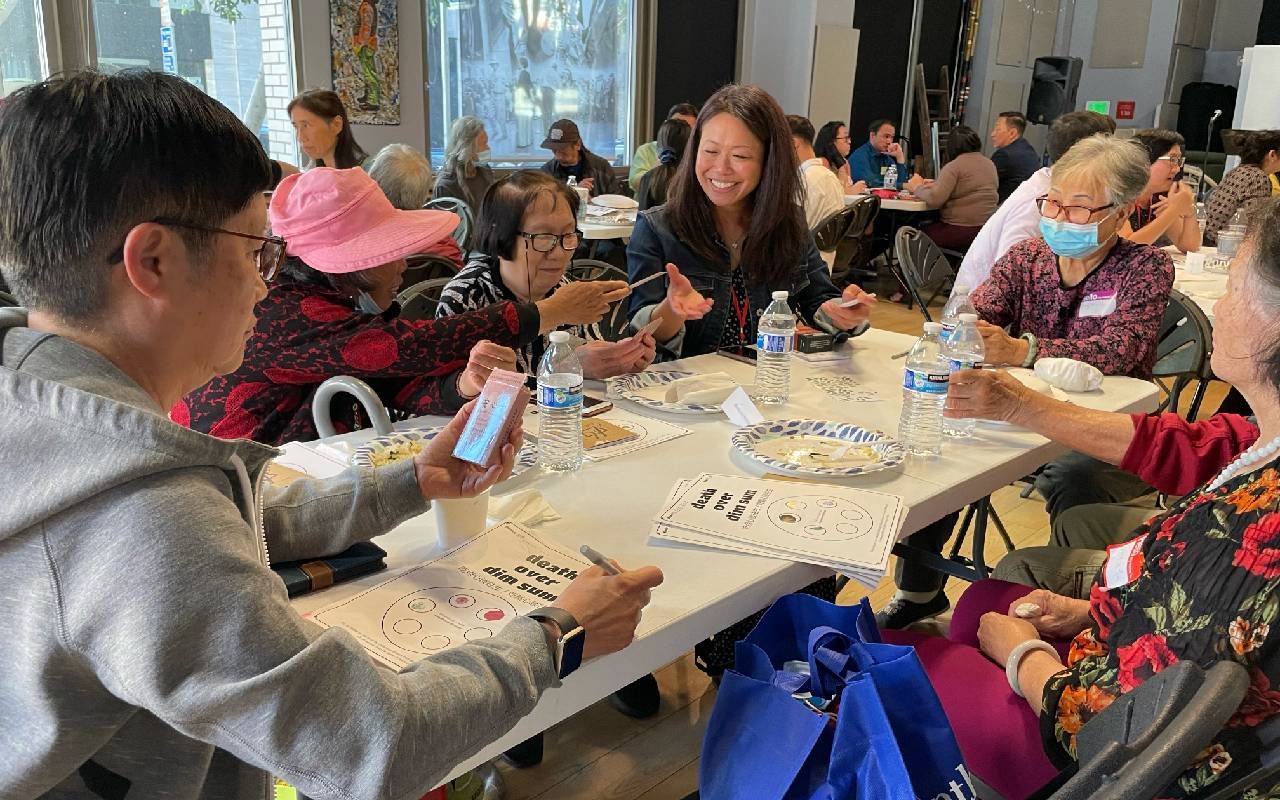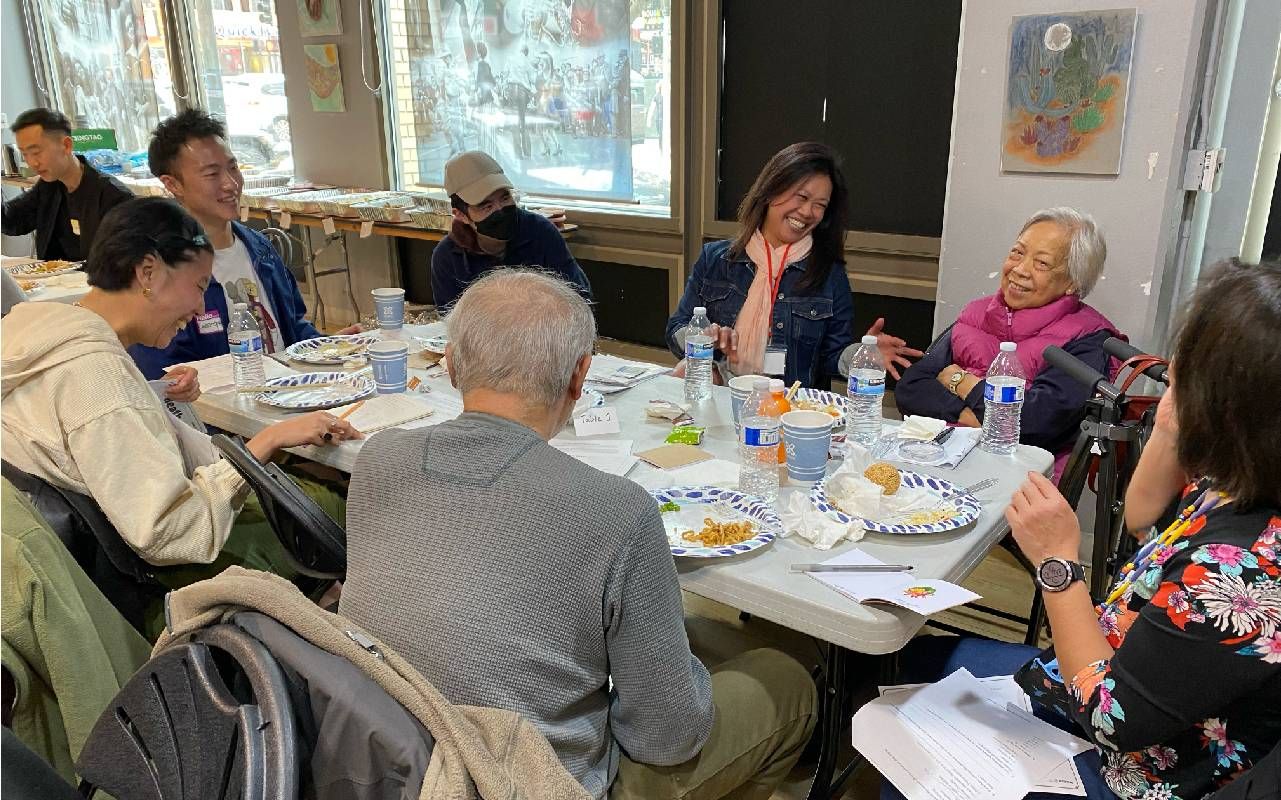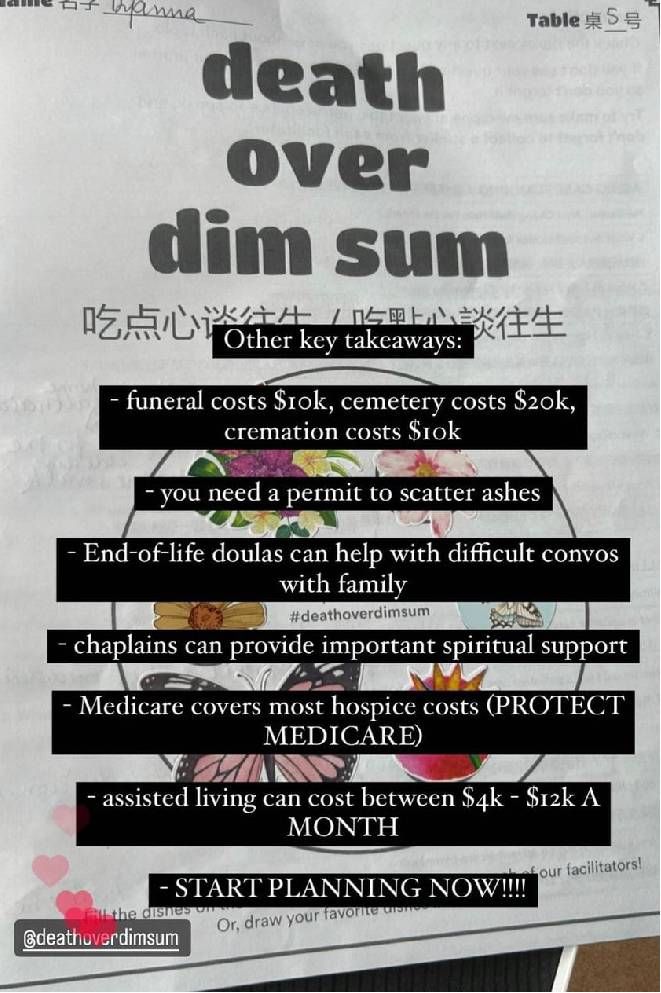Death Over Dim Sum
Conversations about end-of-life issues are difficult for everyone. But in many cultures, these important topics are considered almost taboo to discuss.

"Death and dying are not topics normalized to openly talk about, especially among Asian families," says Chrislyn Choo, 29, of My China Roots, a genealogy startup.
"There's often denial about getting older and end of life or flippant comments attached to shame [with] comments like, 'You'll wish you listened to me when once I'm gone.'"
For these reasons, Holly Chan and Elizabeth Wong founded Death Over Dim Sum, a workshop series geared toward opening up intergenerational dialogues about life, death and beyond.
Why Dim Sum?
Wong, 48, has been a labor and delivery nurse for over 20 years. Wong says, "My role as a nurse working with birth doulas who offer comfort and support at the beginning of life made me wonder why there wasn't a similar doula-type role in helping people as they get older and transition through the end-of-life."
"There's often denial about getting older and end of life or flippant comments."
Wong did some research and discovered that there were, in fact, end-of-life-doulas," so she trained to become one, later co-founding Beacon Light Doulas. As a Doulagivers training partner, she set up a Facebook page to spread word about their programs, which is how she met Chan.
Chan, 29, a user experience designer in Seattle, explains, "I have been passionate about design innovations in the funeral industry and end-of-life care since I was in high school. While I was living in San Francisco I stumbled onto Elizabeth's page and followed it. Elizabeth messaged me and we started chatting online."
The two decided to meet over coffee. They found that despite their different upbringings, they still had much in common when it came to their experiences as second-generation Chinese American women.
The two began brainstorming on how they could work together. Their conversations led to the creation of Death Over Dim Sum. The first workshop was held in 2019 at the End of Life Festival hosted by Reimagine in San Francisco.
They gathered six local experts — Wong among them — on various topics including palliative care, funeral arrangements and financial planning. Frank Chui, the owner of Hang Ah restaurant in San Francisco, agreed to donate the food.
While it may seem odd to talk about heavy topics while enjoying fried rice and dumplings, the two believe it is an ideal combination. "In my family, we often talk over food because it's easier to handle tough conversations when our bellies are warm and full," explains Chan.
"From personal experience, I found dim sum is often a comfort food in Chinese American families, so what better way to bring people together to talk about a taboo subject than over a delicious meal?"

Creating a Comfortable Environment
Both Wong and Chan wanted to ensure an open conversation where all participants would feel safe expressing themselves. Although not mandatory, Wong and Chan do prioritize inviting bilingual subject matter experts who identify as Asian or Pacific Islander.
"I grew up in Chinatown, highly immersed in Chinese culture and surrounded by first-generation immigrants, many of whom spoke limited English. It's important that participants can relate to the experts, understand the information presented and be comfortable asking questions."
Because it can be difficult just knowing how to start the conversation, Wong and Chan modeled the workshop's structure after a traditional dim sum service. "Typically, dim sum involves picking out what food you want to eat from carts being pushed around a busy restaurant," explains Chan.
"It's important that participants can relate to the experts, understand the information presented and be comfortable asking questions."
"At the beginning of the workshop, participants pick up a 'menu' of frequently asked questions, divided by subject matter. They are encouraged to check off what questions they would like to ask the experts, but unlike at a restaurant they are also encouraged to order 'off menu' with their own questions."
James Liu, a Healthcare startup founder in San Francisco, attended the second Death Over Dim Sum in March 2023. He returned for the third workshop, but this time as a volunteer. Liu was pleasantly surprised by the casual and approachable nature of the event.
Liu says, "I appreciated the breadth of the speakers and the topics covered, mixing in both practical topics, such as planning a funeral and what legal documents are required, to the more emotional and spiritual, like the goals of care conversations and navigating family dynamics."
Different Reasons to Attend
Thanks to a grant from San Francisco Palliative Work Group, Wong and Chan have been able to hold three workshops since their inaugural event.
Currently their workshops have only taken place in the San Francisco area but they hope to expand them to Seattle and beyond in the future.
"They helped us face our fear, like 'Let's talk about death and dying so they no longer scare or paralyze us.'"
Participants in the workshops have ranged in age, background and reasons for attending. Choo lives with her aunt who is in her 60s so they attended a workshop together in March 2023. "Holly and Elizabeth created a helpful, safe space for intergenerational conversation," says Choo. "The atmosphere was serious but not intimidating. They helped us face our fear, like 'Let's talk about death and dying so they no longer scare or paralyze us.'"
Dyanna Volvek, 39, of San Francisco attended a workshop in March 2023. She explains, "My partner and I have decided not to have children. People often ask me, 'If you don't have children, what will you do when you get older? Who will take care of you and your husband?' I explain that just because you have children doesn't mean they will take care of you. But these questions got me thinking about what I would do when I am older and my parents age, so I decided to attend the workshop."
Taking Care of Elders
In Chinese families, it is common practice for multiple generations to live together with the expectation that they ultimately become older relatives' caretakers. Wong explains, "My mother, like many in our community, immigrated to America for a better life. Our parents and grandparents made sacrifices for us, and when they age, we feel it is our responsibility to do the same for them."
"Our parents and grandparents made sacrifices for us, and when they age, we feel it is our responsibility to do the same for them."
This feeling of responsibility can be daunting. "I feel guilty that I might not be able to care for my parents or grandparents due to financial constraints," explains Volvek. "It was helpful to be surrounded by other people who understood my feelings due to our shared cultural upbringing."
Anni Chung, President and CEO of Self Help for the Elderly was an expert at two Death Over Dim Sum workshops. Chung says, "Many of the second-generation adults have moved out of the area due to high rents or new work opportunities since Covid. But their elderly relatives may be stuck here. They need to know how to help their loved ones from a distance such as how to choose a facility or how to find a local bilingual caretaker."
People Wait Too Long to Discuss
Throughout her life, Wong has had to find a balance between respecting and honoring her mother 's wishes and inserting herself into conversations that raise safety concerns as her mother ages. "Older adults don't want to lose control or be perceived as frail," explains Wong. "Suggesting they might need a cane or walker can be met with resistance and even anger."
"It may take several conversations. You must start early, go slowly and pull back when necessary."
That is why it is essential to bring up these problematic topics before an acute issue arises. Wong says, "It may take several conversations. You must start early, go slowly and pull back when necessary, perhaps revisiting the topics in a few weeks, months or even years."
Another reason to have these conversations sooner is cost. "People underestimate the expense of long-term care and how much is not covered by Medicare," says Chung. "At the workshop, several elderly Cantonese people spoke candidly what they need at this point in their lives and the costs."
Shared Meal, Shared Experiences
Attending the event caused Choo to rethink some of her views on death and dying. "I realize that it is possible to integrate and honor my family traditions while exploring creative, sustainable ways of passing on in peace," reflects Choo.
In addition to the practical guidance offered by experts, Choo's favorite part of the event were the personal stories people shared around the table. "I loved the candid exchange of perspectives," says Choo. "I learned about a grandmother who took the initiative to set aside funds for her own funeral. She didn't want her family to feel stressed or financially burdened while they were grieving. The fact that death is pricey is something I had never thought about before."

The conversations didn't end when Choo left the event. She says, "I posted an Instagram story about the workshop, which sparked a lot of interest from peers. A group of us are talking about forming a support circle to work on our living wills together."
The workshop was also a starting point for further discussions with her aunt and her parents. Choo says, "I told my parents about Death Over Dim Sum and it led to discussing what they might want when they die. Knowing my parents' wishes will make these decisions easier for me when the time comes."
Not Just Sad
Discussions about the end of life are most often associated with emotions such as fear and sadness. While these are valid feelings, surprisingly, these conversations can also invoke more pleasant emotions such as gratitude, humor, understanding and empathy.
"The most consistent and inspirational message I've heard is that the dying process contains so many profound lessons around living."
"The most consistent and inspirational message I've heard is that the dying process contains so many profound lessons around living," says Liu. "So, I wish we could discuss them earlier and more frequently, especially as it relates to how these conversations can inspire reflection and action on how we want to live in the moment."
Talking about death can help people live more full lives. "Rather than rushing to say goodbye at the end, it's possible to say a 'long goodbye'," explains Choo. "Don't wait until your loved one is old or ill to tell them what they mean to you or things you want them to know. Start right now."
Death Over Dim Sum's next event will be held on February 18, 2024 from 12-3 pm at the International Hotel Manilatown Center in San Francisco.


